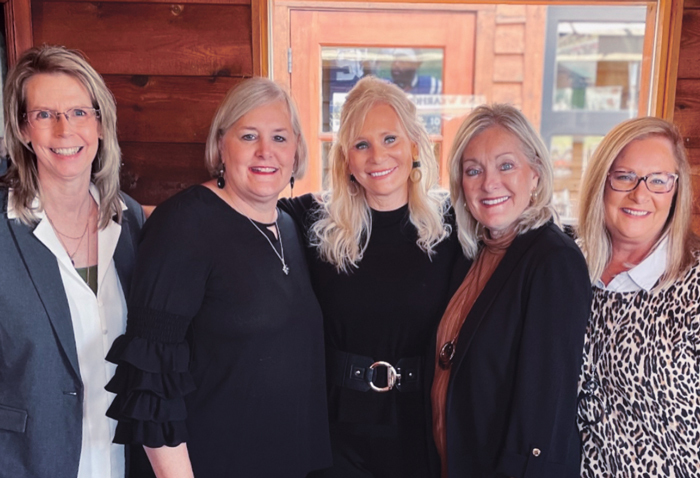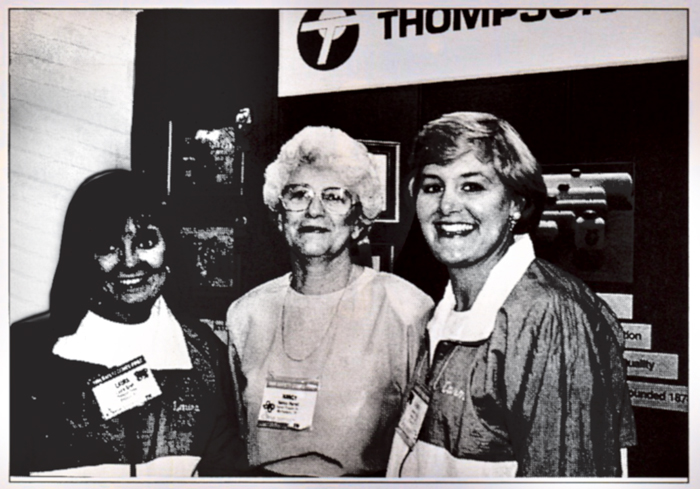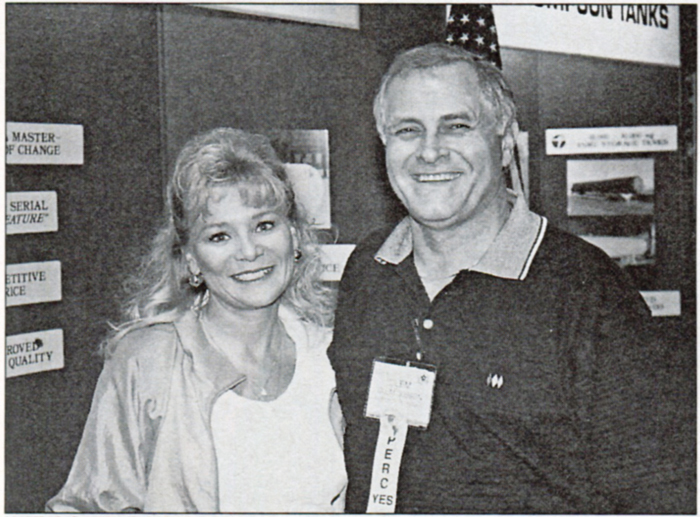How the ‘Thompson girls’ made a name for themselves selling propane tanks

The “Thompson girls” in 2023: From left, Sheila Culver, Carmen Finley, Teresa Dorroh, Laura Croft and Melissa Pressley. (Photo courtesy of Teresa Dorroh)
A smooth and calming voice. A smile that never stopped. A familiar face since the sixth grade. And a personality made for customer service.
Teresa Dorroh saw something special in each member of her team, something that foreshadowed the bond they would form and the success they would find throughout much of the 1990s and beyond while selling propane tanks for Thompson Tanks.
In 1990, Dorroh says, Denver-based Thompson Pipe & Steel Co. tasked her with researching the propane tank market as it sensed opportunity beyond its water pipe business. The Kentucky native discovered a high demand for propane containers and a need for another market entrant. That research led Thompson to establish a propane tank production facility, part of a 9-acre plant, in Princeton, Kentucky.
“Once we started getting orders, I couldn’t keep up,” Dorroh recalls.
Dorroh, who ascended to national sales and marketing manager for the company, had a say in the new hires that would help transform Thompson Tanks into a noted player in the propane tank manufacturing business. Her team began to take shape.
- Sheila Culver had the smooth voice and “this unique way of calming everybody down.”
- Carmen Finley “was so nice and smiled all the time.”
- Laura Croft “because I had known her my whole life,” friends since grade school.
- Melissa Pressley “was excellent at customer service and had the personality for it.”
Together, the five original members of the Thompson Tanks sales team became known as the “Thompson girls,” an influential group that rose to prominence in the manufacturing sector while breaking gender barriers in a male-dominated industry.
Close connections
The Thompson girls grew closely as colleagues and friends.
“When I hired each one of them, we developed special bonds,” Dorroh says.
The group also grew closely to the propane industry. It recalls the strong family-oriented nature of the industry at that time and the many mom-and-pop family companies.
The family dynamic of the propane industry, Croft says, was a big reason for their success.
“That industry fit so well with us,” she says. “Most of us had children. That was perfect for us. We gravitated toward those families. It’s because we were women [that] we wanted to get to know the wives – because back then so many wives worked in the industry alongside their husbands. We became friends with their wives.”
The family companies also took the Thompson girls “under their wing, and we became their family,” Croft says, as they got to know industry pioneers such as Jim Cannon, Glenn Miller and Milford Therrell.
“We became really good friends with our customers,” adds Croft, recalling the likes of Rob Love of Lampton-Love; Jon Huddle of Diversco Supply; Glenn and Joyce Zimmerman of Martindale Propane; Jessie Johnson and Stuart Weidie of Blossman Gas; and Charles and Sally Gayle Revere of Revere Gas.
Much of the sales process happened over the telephone. Finley remembers the daily calls with customers. The group laughs when recalling how Finley always reminded customers about her birthday.
“We had a lot of fun,” Finley says. “We enjoyed what we did. We enjoyed the people. They were just like us – very down-to-earth, family-oriented people. We fit in so well with one another. We built that camaraderie just by being able to discuss our families with one another and getting to know everyone.”
Dorroh says the Thompson girls “did it all” for their customers – from sales and customer service to shipping parts.
“Our customer service was amazing,” she says. “We took care of everybody and loved everybody.”

Croft, left, and Finley, right, in 1994 with customer Nancy Harrell of Harrell Propane. (Photo from LP Gas archives)
Getting results
Growth came fast for Thompson Tanks – from about $2 million in orders at the outset of production, to $10 million in the first year after the company established the tank plant, to $20 million in sustained sales, according to Dorroh, who spent 14 years with the company.
Thompson Tanks offered propane tanks from 120 gallons to 1,000 gallons and shipped tanks throughout the U.S. and internationally. It also had a partnership to sell Manchester Tank’s 420 verticals until Thompson began to manufacture its own 420.
“We knew our product,” Finley says. “We were offering something different that the industry hadn’t seen before. We offered a spiral weld, and nobody else offered a spiral weld. We offered a product that was different, stronger, better. People were intrigued by that.”
Thompson’s spiral weld was designed to increase weld integrity by distributing the pressure across the tank’s surface.
“We had to differentiate ourselves from everyone else,” Dorroh says. “We had the product that was different; then we developed the team that was different; then we took that team, and we weren’t just women. We knew our product; we spent a lot of time studying.”
The Thompson girls relied on one another, their product and, along the way, the insight of industry leaders like Clem Gibson, their director of sales; consultant Ross McDermott; and Rollie Fortner of Fortner Gas, one of their first customers.
Gibson imparted his knowledge about sales on Dorroh and the team.
“I had a lot of passion and a lot of work ethic but not the training,” Dorroh says. “He trained me – and he trained them – and helped us through to where we knew and had the tools to really perform.”
Changing perceptions
The Thompson girls’ entry into the industry didn’t come without obstacles.
Dorroh remembers an exchange with a salesman from a competing company who told her, “You know you’re not going to make it in this industry.”
“Why do you say that?” she asked him.
“I’ve been in this industry for years, and there’s not any women,” she recalls him saying.
“He was trying to scare me,” Dorroh says today. “I looked at him and said, ‘Evidently you haven’t met me. I will make it.’ I was in the industry for 30 years.”
The group also recalls men walking into their trade show booth and looking for a representative from the company, seemingly overlooking them.
“We’d be there with our badges on,” Croft says. “Teresa said we’re going to have to start dressing alike.”
With the group recalling the story years later during a video call, Finley holds up a blue and white Thompson Tanks windbreaker that helped to give the team more of an identity – and something a little more comfortable to wear while assembling and disassembling their trade show booth. They also feel that attire helped to loosen up an industry that was accustomed to wearing coats and ties, and dresses, heels and hose.
The industry only helped to boost that identity when it created the “Thompson girls” moniker, which they embraced.
“I am a Thompson girl,” Croft says. “I am really proud of the reputation we had in the industry, and people still remember us as Thompson girls.”
Dorroh adds, “When I hired any of them, I said we have to always be known and respected as ladies. … We always were classy and always acted like a lady. That’s something I’m proud of with every one of these ladies because they’re all fantastic people. They were just there to sell tanks and make money for our family.”
They also recognize the impact they had in the propane industry, as being among the first women to hold sales positions for an equipment manufacturer.
“I think we opened the door for women in this industry,” especially in sales, Croft says.
Northwest Pipe Co. acquired Thompson Pipe & Steel and Thompson Tanks in 1996, closed the Kentucky plant and moved propane tank manufacturing to Denver and Monterrey, Mexico. The sales team remained in Kentucky, but over the years, Northwest Pipe began to focus more on its water infrastructure business. Facing operational cost challenges, it closed the propane tank division.
Culver was the only remaining member of the Thompson team at that time (2009). She stayed about another year, working in the pipe division.
“It was just a great experience,” Dorroh says of her time with Thompson Tanks. “If we could put what we had in a bottle, it would sell. That’s all I know.”

Dorroh says sales director Clem Gibson gave her and the Thompson girls “the tools to really perform.” (Photo from LP Gas archives)
Where are the ‘Thompson girls’ now?
The “Thompson girls,” with the years they worked for Thompson Tanks, their current positions and other notes and quotes.
Laura Croft
Thompson Tanks: 1992-2001
Current position: Sales at Manchester Tank & Equipment
Notes and quotes: Croft is the only Thompson girl still working in the propane industry. She worked at Trinity Containers from 2001-08. “We started something from the ground up, and there’s something special about that.”
Sheila Culver
Thompson Tanks: 1991-95 and 1998-2009
Current position: Customer service for Sedgwick, a claims management company
Notes and quotes: After Thompson, Culver worked with her family before joining Sedgwick, where she’s been for 13 years. She calls her time with Thompson Tanks “a dream job” because of the people and the industry. “It was a family group. It was the only job I’ve had in sales where there was no competition [with one another]. You were tickled to death when anybody had a great day or month. That’s one of the things I miss most.”
Teresa Dorroh
Thompson Tanks: 1989-2003
Current position: Senior office/account manager at Benton-Georgia LLC, a contractor in the natural gas industry
Notes and quotes: Dorroh spent 14 years at Trinity Containers and 2.5 years at RegO Products. After RegO, she started painting and now sells her artwork online. “I had never drawn or painted a picture in my life.”
Carmen Finley
Thompson Tanks: 1992-97
Current position: Trigg County (Kentucky) clerk
Notes and quotes: Finley worked for 13 years at a plastics manufacturing facility and in public service before running for office. She is in her third term and ninth year as the county clerk. “Thompson was a gateway for me to be the people person I am. I love people. We all love people. We’re very much ‘people people.’”
Melissa Pressley
Thompson Tanks: 1992-2001
Current position: Title abstractor at Court Street USA
Notes and quotes: Pressley managed a cardiology office for 13 years and worked as an assistant to the superintendent for the local board of education. “These girls raised me in the propane business. I was raw. I didn’t know the difference between a valve or a gauge. I would have floundered big time without these ladies. We were family.”
The art of selling
The “Thompson girls” share best practices for salespeople and how to take care of the customer.
Croft: “Be yourself.”
Pressley: “Be knowledgeable, be respected and be real.”
Finley: “Care about them, and be there to help them.”
Dorroh: “Do what you say you’re going to do, and if you can’t do it, follow up and tell them the truth. We didn’t always have good news, but whatever that news was, we told them the truth, and it was respected.”
Culver: “Learn your customer. Know what they’re looking for before you try to give them what you have. … You have to accommodate them.”
















